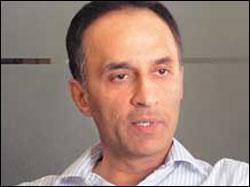The Reserve Bank of India (RBI) recently said foreign banks those have more than 20 branches should have a steeper target for priority sector lending. Deutsche Bank, with 17 branches in India, however, does not see the stipulation as a hindrance to its branch expansion plan. Ravneet Gill, the German lender’s India CEO, tells Manojit Saha in an interview, that it has an open mind for taking the subsidiary route as it allows them to open more branches which will be aiding them to grow the retail business. Excerpts:
 RBI has prescribed a higher priority sector lending target for foreign banks having more than 20 branches in India. Deutsche Bank currently has 17 branches here. Will you go slow with your expansion strategy to avoid a higher priority sector lending target?
RBI has prescribed a higher priority sector lending target for foreign banks having more than 20 branches in India. Deutsche Bank currently has 17 branches here. Will you go slow with your expansion strategy to avoid a higher priority sector lending target?
Not really. If you see, in the last seven months, we have opened two new branches, in Ahmedabad and Surat. We will have to wait for the final guidelines on subsidiarisation and then take a call on expansion. For some businesses, we will need more branches, whereas some of our other businesses which are wholesale in nature can grow from our existing footprint. For us, all options are open. The eventual way forward shall be dictated by the opportunities we focus on and how best to monetise them.
So, are you open to convert into a subsidiary?
The benefit of converting into a wholly-owned subsidiary is that it will give us more flexibility with respect to opening new branches. However, we have to also see what are the corresponding obligations and capital implications. Guidelines are currently being framed and we will respond once the final norms are out. India is a very important market for us and we can clearly see ourselves growing significantly here. To that extent, we will keep our options open.
Do you think the recent sharp correction in commodity prices will provide some scope to RBI for monetary easing?
There are a couple of factors. First, reduction in crude oil and gold prices, and we are presuming these will sustain, will make the current account deficit (CAD) look much better. Also, inflation is headed in the right direction. So, it definitely gives RBI a little more headroom than what would have been anticipated three-four weeks earlier.
Second, RBI has already done two rate cuts this year but transmission has not happened. This was mainly due to tight liquidity, which prevented banks from cutting deposit rates. So, I think, RBI is going to look at this process in a more holistic manner. They may, therefore, look at cutting both the repo and cash reserve ratio and supplement that with open market operations. With more liquidity in the system, banks will be able to moderate lending rates.
Several Indian corporate houses and financial institutions are re-visiting markets abroad to raise funds. Will this continue, as domestic rates are likely to remain firm?
There are two factors driving this. One, of course, is the cost of funds and, clearly, dollar borrowing is much cheaper. The other is the recognition on the part of corporate India that it needs to diversify its sources of funding. Basel-III, in its present form, shall ensure that bank deleveraging remains an enduring theme and the companies, therefore, don’t want to be dependent only on bank funding and are actively accessing international bond markets. The response received has been excellent.
Do you think Indian banks are ready to adopt Basel-III?
India needs a lot of developmental credit. That being so, the question is whether India should be adopting Basel-III in totality, given its onerous capital requirements and which, in turn, could constrain the banks’ ability to lend. Perhaps we should examine if Basel-III needs to be modified to the Indian context without compromising the overarching objective of ensuring that banks are well capitalised & solvent at all times.
How comfortable are you with Deutsche Bank’s credit quality?
Our asset quality is sound and not a source of concern at this point. Right now, the concern is how to grow faster.
Are you seeing any stress on your mid-corporate and SME loan portfolios?
Liquidity is an issue for the mid-corporate segment because trade cycles have become longer. In many cases, where banks have these as non-performing assets, the main reason is liquidity. As liquidity returns in the market, many of these become standard assets.
With credit demand from the corporate sector drying up, Indian banks are focusing on retail. What are your plans for the retail segment?
Retail is a very small segment of our India asset book. However, the intention is to grow it significantly over the next three to four years. Our retail focus are mortgages and business banking, and, not so much of consumer finance.
There are talks of green shoots in the economy. Is there any concrete evidence that suggests that investments will pick up this year? What are the factors that will support revival of investment?
On the policy side the government has been making all the right moves & following it up with sound execution. After all, six months back, the single biggest threat for India was a rating downgrade. And today, that is not even a material concern. So, while we have not seen substantive physical investment on the ground yet, the confidence required to revitalise the investment cycle is being steadily built up. In this respect, a lot of work has been undertaken by the cabinet committee on investment, but it hasn’t probably been fully recognised by the market yet.
The difference this time round is that the revival shall be kicked-off by the public sector & the private sector shall follow. Given that several of these enterprises are sitting on large surpluses, the ability of the public sector to serve as a catalyst should not be underestimated.
What had prompted the bank to exit credit card business in India?
We had a very high quality credit card portfolio. It was a premium segment and was doing exceedingly well. However, in the credit card business, to grow organically in a disciplined fashion is difficult & time consuming. On the other hand, the challenge for inorganic growth was valuation. So, we had two options. Either, to get premium valuation and exit the business and deploy the money in other retail businesses where we could grow faster or make an absurdly expensive acquisition. We chose the former.
Deutsche Bank has been among the top investment banks in the country in the last few years. How do you see this business growing?
In India, we have a very well diversified franchise. Transaction banking, foreign exchange, structured financing, investment banking – are all market leading businesses and have significantly contributed to the Bank’s bottom line. In addition, our retail businesses — retail banking, Asset and Wealth Management - too are profitable for us. So we are committed to growing each of these vectors and shall absolutely make the necessary investments required to do so. Client centrality is the big motivation that drives us and we, as a firm, will do everything to broaden & deepen our relevance to our clients in this strategic market.











